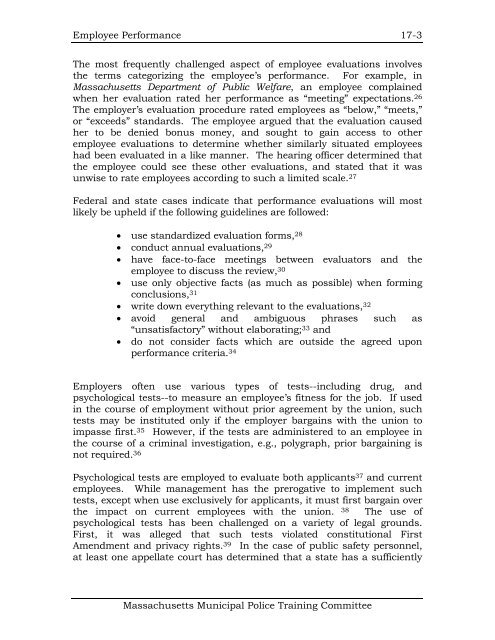Management Rights - AELE's Home Page
Management Rights - AELE's Home Page
Management Rights - AELE's Home Page
You also want an ePaper? Increase the reach of your titles
YUMPU automatically turns print PDFs into web optimized ePapers that Google loves.
Employee Performance 17-3<br />
The most frequently challenged aspect of employee evaluations involves<br />
the terms categorizing the employee’s performance. For example, in<br />
Massachusetts Department of Public Welfare, an employee complained<br />
when her evaluation rated her performance as “meeting” expectations. 26<br />
The employer’s evaluation procedure rated employees as “below,” “meets,”<br />
or “exceeds” standards. The employee argued that the evaluation caused<br />
her to be denied bonus money, and sought to gain access to other<br />
employee evaluations to determine whether similarly situated employees<br />
had been evaluated in a like manner. The hearing officer determined that<br />
the employee could see these other evaluations, and stated that it was<br />
unwise to rate employees according to such a limited scale. 27<br />
Federal and state cases indicate that performance evaluations will most<br />
likely be upheld if the following guidelines are followed:<br />
use standardized evaluation forms, 28<br />
conduct annual evaluations, 29<br />
have face-to-face meetings between evaluators and the<br />
employee to discuss the review, 30<br />
use only objective facts (as much as possible) when forming<br />
conclusions, 31<br />
write down everything relevant to the evaluations, 32<br />
avoid general and ambiguous phrases such as<br />
“unsatisfactory” without elaborating; 33 and<br />
do not consider facts which are outside the agreed upon<br />
performance criteria. 34<br />
Employers often use various types of tests--including drug, and<br />
psychological tests--to measure an employee’s fitness for the job. If used<br />
in the course of employment without prior agreement by the union, such<br />
tests may be instituted only if the employer bargains with the union to<br />
impasse first. 35 However, if the tests are administered to an employee in<br />
the course of a criminal investigation, e.g., polygraph, prior bargaining is<br />
not required. 36<br />
Psychological tests are employed to evaluate both applicants 37 and current<br />
employees. While management has the prerogative to implement such<br />
tests, except when use exclusively for applicants, it must first bargain over<br />
the impact on current employees with the union. 38 The use of<br />
psychological tests has been challenged on a variety of legal grounds.<br />
First, it was alleged that such tests violated constitutional First<br />
Amendment and privacy rights. 39 In the case of public safety personnel,<br />
at least one appellate court has determined that a state has a sufficiently<br />
Massachusetts Municipal Police Training Committee
















